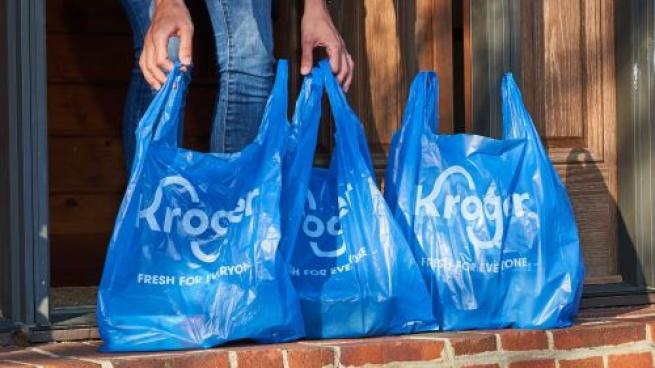Kroger Fulfillment Network Arrives in Indianapolis

Extending its grocery delivery reach, The Kroger Co. is expanding its fulfillment network in central Indiana. The addition of a delivery “spoke” this holiday season provides a modern e-commerce experience to the Indianapolis area.
Located at 9222 E. 33rd Street in Indianapolis, the 48,000-square-foot facility will collaborate with the hub in Monroe, Ohio, to connect customers with fresh food. At launch, Hoosiers in 35 central Indiana ZIP codes, mostly in the Indianapolis area, can experience Kroger Delivery. Richmond, which is near the Ohio hub, is also part of the coverage area.
Kroger Delivery will offer variable fees that don’t require customers to provide a tip and are influenced by several factors like a customer’s loyalty, delivery window popularity, route optimization and the lead time of an order.
“This fulfillment center is another example of how Kroger is transforming e-commerce in the grocery industry using a vertically integrated network to provide a reliable and consistent delivery service that repeatedly receives favorable customer feedback like a best-in-class Net Promoter Score. Our expansion in Indiana represents our commitment to delivering fresh, affordable food in both existing and new geographies,” said Bill Bennett, Kroger VP and head of e-commerce. “As our e-commerce business accelerates, we’re excited to continue expanding our reach and loyalty by delivering our customers an exceptional service for as little as $6.95, powered by high-tech facilities.”
The expansion in Indianapolis results in an expanded partnership with U.K.-based Ocado, a provider of technology for grocery e-commerce. The companies initially revealed a collaboration in 2018 to establish a delivery network that combines artificial intelligence, advanced robotics and automation.
The delivery network relies on highly automated fulfillment centers. At the hub sites, more than 1,000 bots whizz around giant 3D grids, orchestrated by proprietary air-traffic control systems in the unlicensed spectrum. The grid, known as “The Hive,“ contains totes with products and ready-to-deliver customer orders.
As customers’ orders near their delivery times, the bots retrieve products from The Hive and are presented at pick stations for items to be sorted for delivery, a process governed by algorithms that ensures items are intelligently packed. For example, fragile items are placed on top, bags are evenly weighted, and each order is optimized to fit into the lowest number of bags, reducing plastic use.
After being packed, groceries are loaded into a temperature-controlled delivery van, which can store up to 20 orders. Powerful machine-learning algorithms optimize delivery routes, considering factors such as road conditions and optimal fuel efficiency. Vans may travel up to 90 miles with orders from the hub and spoke sites to make deliveries.
The delivery network will also continue to leverage stores and third-party partners to deliver certain orders.
Kroger Chairman and CEO Rodney McMullen said that Kroger Delivery “underpins the permanent shift in grocery consumer behavior and elevates our position as one of America’s leading e-commerce companies.” Through the delivery network, the company now serves customers in Florida, as an example, without traditional brick-and-mortar stores.
Kroger unveiled the Monroe fulfillment center, its first, earlier this year in April, followed by another in Groveland, Fla. The fulfillment network is planning additional sites in California; Dallas; Forest Park, Ga. (Atlanta); Frederick, Md.; Phoenix; Pleasant Prairie, Wis.; and Romulus, Mich. (Detroit), as well as south Florida and the Northeast.
Meanwhile, the Ocado-powered Indianapolis fulfillment center will create up to 150 jobs and is currently hiring associates for various roles, including delivery drivers, with a starting wage of $19, plus benefits like health care and retirement.
The Indiana Economic Development Corpo. (IEDC) has committed to invest in Kroger in the form of performance-based tax credits based on the company’s job creation and investment plans.
In other news, Ocado recently won a patent-infringement case filed by a rival firm. AutoStore had filed the lawsuit last year in both the United States and the United Kingdom, saying that it was the inventor and rightful owner of patents filed by the Ocado Group.
Serving more than 11 million customers daily through a digital shopping experience and almost 2,800 retail food stores under a variety of banner names, Cincinnati-based Kroger is No. 3 on The PG 100, Progressive Grocer’s 2021 list of the top food and consumables retailers in North America.
progressivegrocer.com

